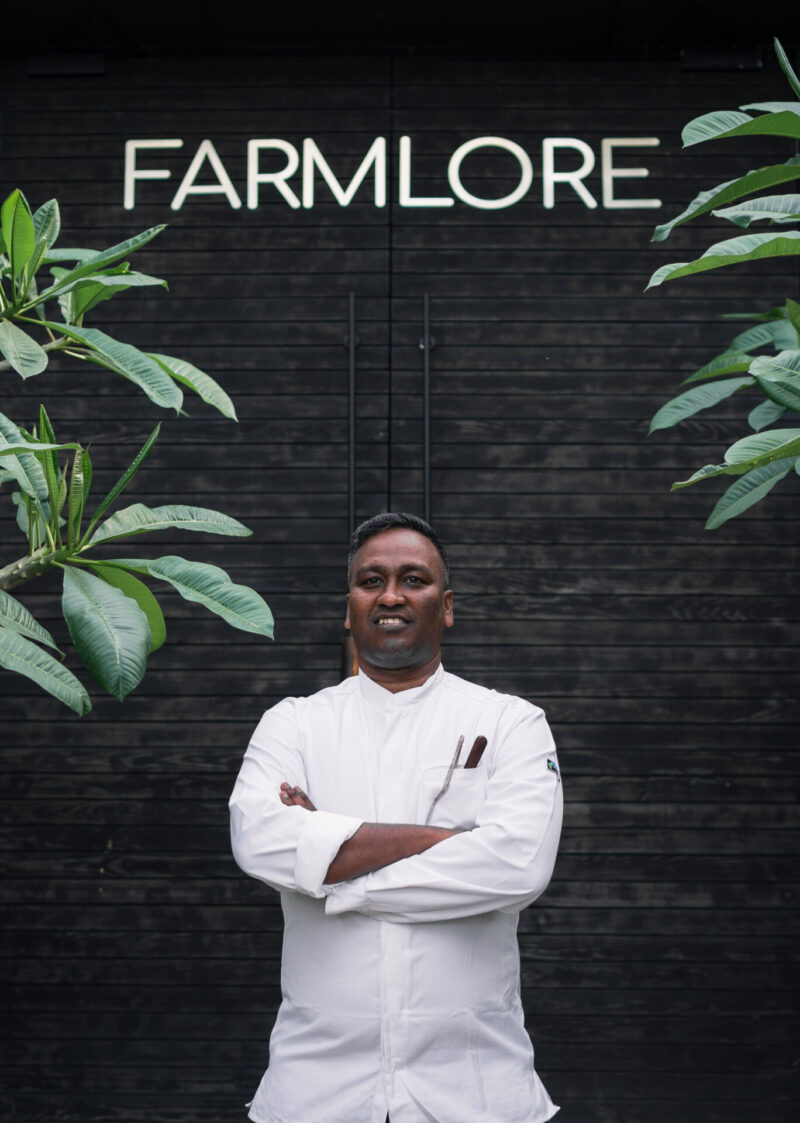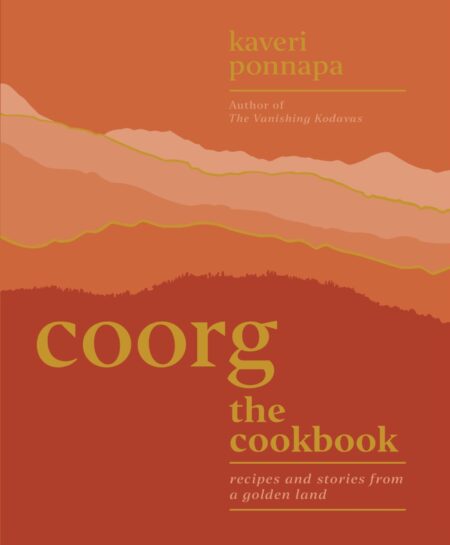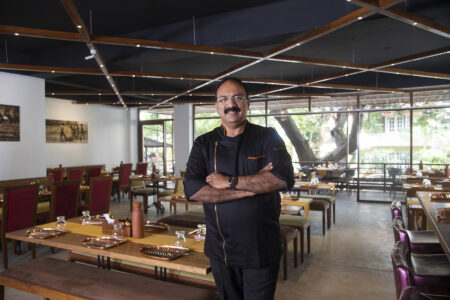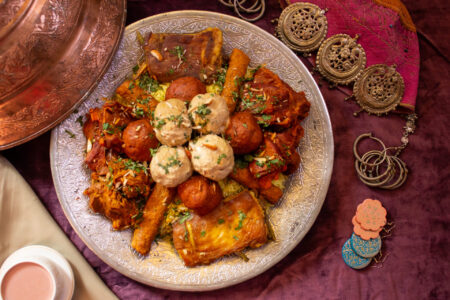The changing seasons impress themselves on your senses as you follow long walkways to get to Farmlore — you are greeted by the rustling of coconut fronds and birdsong, and in late summer the ground is scattered with dried mango leaves from the orchard that surrounds the restaurant. Vegetable gardens that feed the kitchen being worked in the distance are visible.
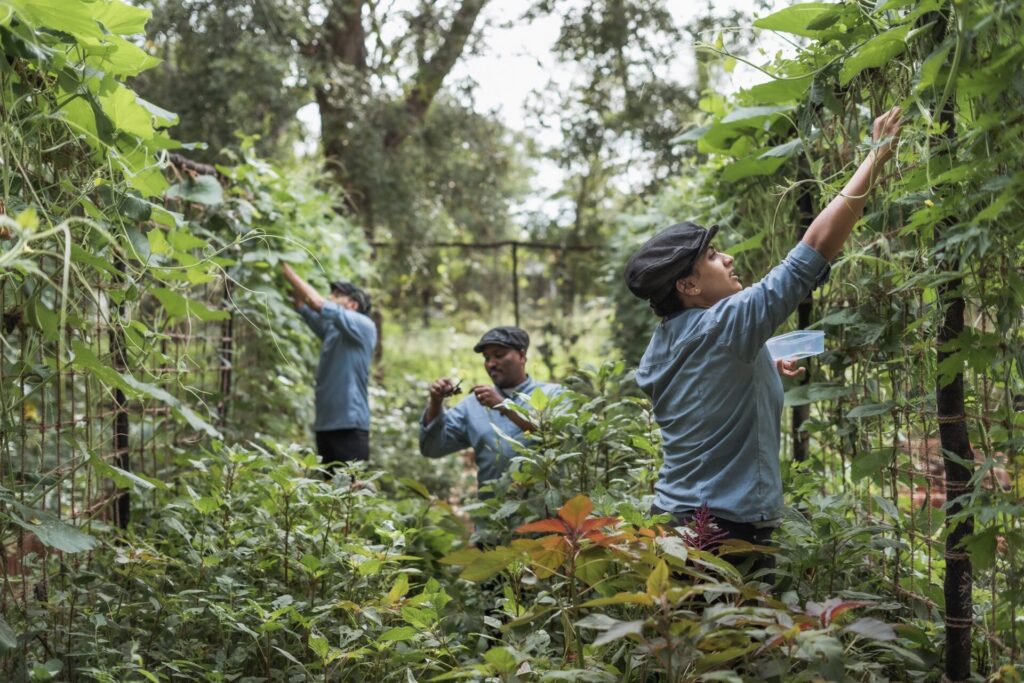
The tropical plantings around the main building are lush and profuse, ushering you into a spare, contemporary space, which looks dramatic at night, lit up by the solar panels that power the entire establishment. Set in 37 acres of farmland on the outskirts of Bengaluru, the 18-cover restaurant opened in 2021, helmed by a small team: Kaushik Raju, Founder, Johnson Ebenezer, Chef patron and co-founder, Mythrayie Iyer, Head Chef and Avinnash Vishaal.

Each of the chefs comes with notable credentials: Chef Johnson was Executive Chef at the Michelin-star Nadodi, Malaysia, while Mythrayie Iyer, previously of Avartana, Chennai, also worked at Noma, and Avinnash Vishaal at the three-Michelin-star Frantzen, Sweden.
Together, they have created a dining experience which relies on the best available, locally sourced ingredients, modern techniques, a constantly shifting exploration of local food traditions combined with striking presentations and flavours that have quickly secured them a place on Condé Nast Traveller India’s Top 50 Restaurants.
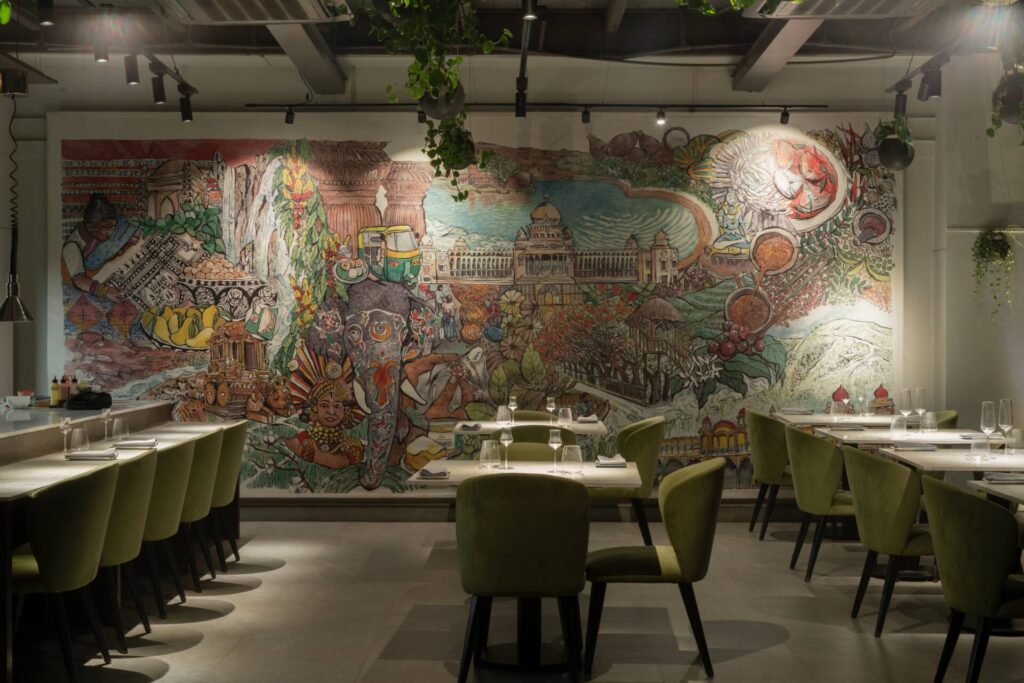
With no menu as a reference point, what you dine off depends on seasonal availability: the 5-course lunch menu changes weekly, and the 10-course dinner dégustation menu every month.

On one occasion, we ate Oysters on the half shell with delightfully sharp flashes of pomelo, followed by generous heaps of blue crabmeat topped with corn foam and an unexpected chilli peanut crumble— a nod to northern Karnataka’s extensive use of spice and peanuts in local cuisine. A spectacular Yelaki Kathai used every part of local banana varietals to present Red Mullet from Rameshwaram, with mashed plantain, and a fermented sauce made from charred banana skins, while Mysore Chigurele was a superb coming together of duck with betel leaf and strawberries. The elements of surprise and delight lasted right through the meal, concluding with Kal, a vivid and luscious course of compressed melons and stone fruit garnished with ginger leaves. The daily brainstorming around available ingredients leads to thought-provoking juxtapositions of flavour and texture that are astonishing and memorable. “Our dishes are designed to evoke a sense of wonder, curiosity, and delight,” say Chef Johnson Ebenezer.
Kaveri Ponnapa: Farmlore runs on the principles of temporality and seasonality, one of constant movement and observation. The idea is that there is no destination and no end to the experience of food cooked at the restaurant. As a first-time guest, what can one expect on the plate?
Chef Johnson Ebenezer: At Farmlore our menus reflect the ever-changing landscape of nature. We don’t believe in rigid culinary frameworks. Instead, we allow the seasons to guide us, and the freshest ingredients to dictate our creations. As a first-time guest, you can expect a culinary journey that’s deeply connected to the land, the climate and culture of our region.
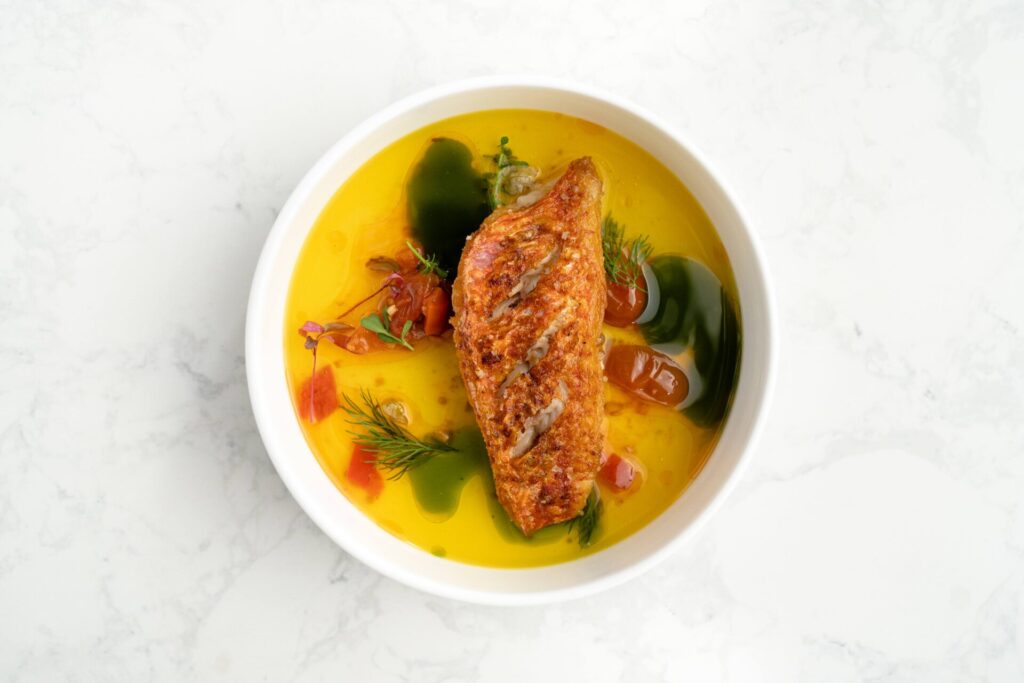
On your plate, you might find a delicate composition of flavours and textures that showcase the best of the season’s produce—a tender, just-picked vegetable, expertly paired with a fragrant herb and a drizzle of artisanal oil, or a perfectly seared piece of locally sourced fish or lamb, served with a rich, reduction sauce made from the finest, small-batch ingredients. You can expect a unique, one-of-a-kind creation that’s been crafted with care, and a deep respect for the natural world, framed by the stories, emotions, and connections it evokes.
KP: Since there are no menus, the dishes are not named and presentations keep changing. What are some of the challenges that you face in having to constantly create new dishes?
JE: The freedom to innovate and experiment is exhilarating, but it comes with its own set of issues. One of the biggest challenges we face is the unpredictability of nature. Since we rely heavily on seasonal produce, we have to be prepared for unexpected changes in weather, soil conditions and pest management. Our dishes can change dramatically from one day to the next, and we have to be agile and adaptable to respond to these changes.
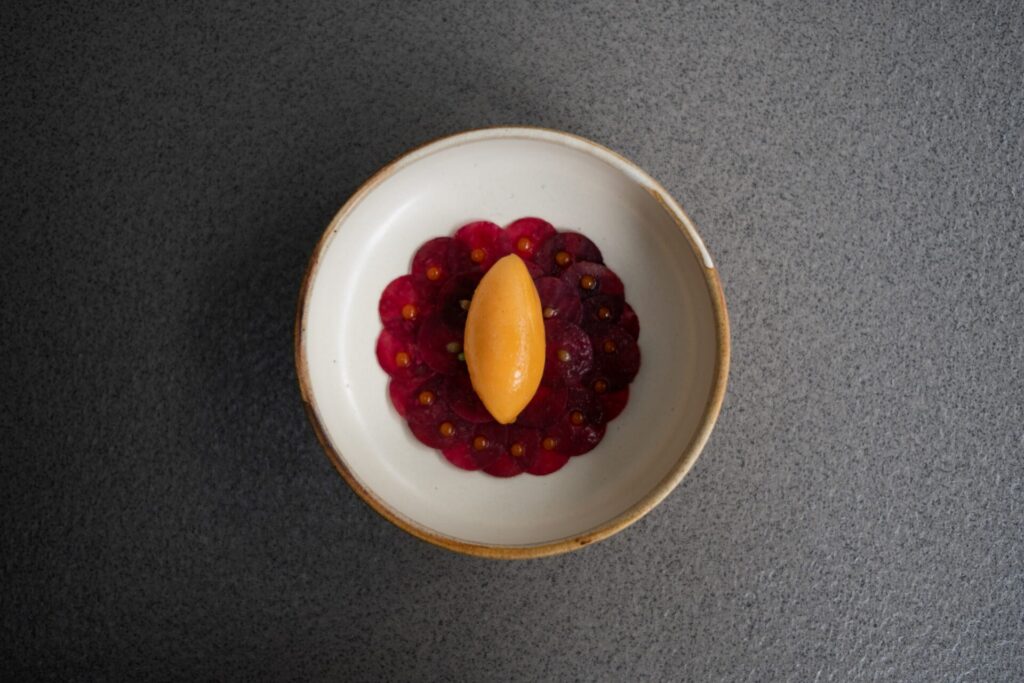
With no menus or dish names to fall back on, we have to rely on our instincts, experience, and knowledge of flavour profiles to create something truly unique and memorable every time. Our commitment to using only the freshest, locally sourced ingredients requires a deep understanding of the local food ecosystem and the ability to build strong relationships with our suppliers and farmers. Finally, we have to communicate our vision and creativity to our guests, relying on storytelling and descriptive language to convey the inspiration and thought process behind each creation. It requires a high degree of emotional intelligence, empathy, and communication skills to connect with our guests. It’s journey that requires creativity, resilience, and a deep passion for food, nature, and storytelling.
KP: The location on a 37-acre Mango and coconut farm creates a unique dining ambience, and also plays a practical role in provisioning the kitchen. To what extent does the farm feed the restaurant?
JE: The symbiotic relationship between our farm and restaurant is one of the unique aspects of the Farmlore experience. The farm plays a vital role in provisioning our kitchen. We’re proud to say that between 40 to 60% of the produce used in our kitchen comes directly from our farm. This ensures the freshness and quality of ingredients and allows us to showcase the unique flavours and characteristics of the produce. For instance, Halikar cows, a breed native to Karnataka, renowned for rich, creamy milk, roam freely on our farm’s pastures, feeding on an array of grasses, herbs, and plants. This diverse diet yields milk rich in nutrients, with a unique, subtle, flavour profile. The abundance of wood on our property is used for cooking, imparting a smoky flavour in our wood-fired oven, and adding nuance to our wood-smoked meats. By leveraging the resources of our farm, we’re able to create an immersive and sustainable dining experience that showcases the best of our produce and natural resources.
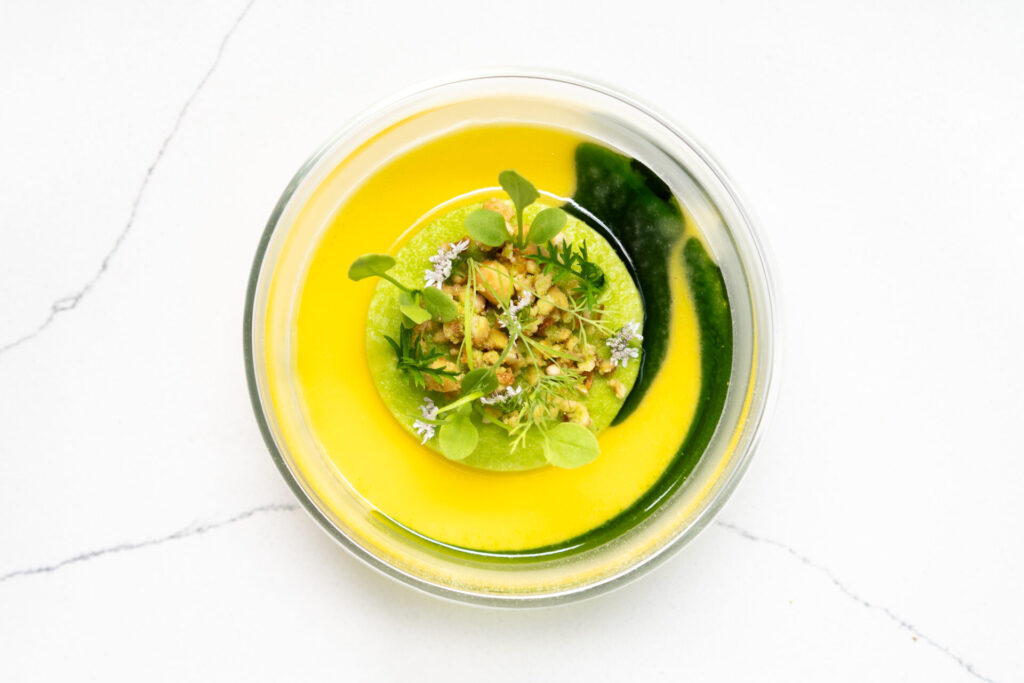
KP: Apart from ingredients sourced from the farm, many distinct elements reflect local dishes from Bengaluru and Karnataka. Would you say that you have a deliberate focus on the rich culinary traditions of the southern states?
JE: Growing up in Chennai, I had the privilege of being surrounded by the culinary traditions of South India. My culinary journey included honing techniques in my cruise and luxury hotel career. Eventually, when I moved to Kuala Lumpur to helm Nadodi, I discovered my voice as a chef. I cook with local produce, telling local stories through food, and reimagine traditional recipes in a way that honours their heritage while infusing them with fresh creativity. Through my cooking, I aim to tell the story of South India’s rich cultural heritage, and exploring the nuances of our flavours.
KP: What is the idea behind offering hand-forged Uruuk blade knives at the table?
JE: Offering hand-forged Uruuk blade knives at the table is rooted in our desire to pay homage to the region’s traditional craftsmanship. The Uruuk blade knife is an iconic symbol of South Indian culture, particularly in the states of Tamil Nadu, Kerala and Karnataka. For centuries, these hand-forged knives have been crafted by skilled artisans using techniques passed down through generations. The handles are crafted from three woods of indigenous trees native to Peninsular India: Ebony, Rosewood, and Indian Laurel, each chosen for its unique characteristics and cultural significance. By offering these exquisite knives at the table, we aim to create tactile experience of holding a hand-forged knife, feeling its weight and balance and using it to savour our carefully crafted dishes is designed to evoke a sense of wonder and appreciation for the region’s traditional craftsmanship.
KP: While the degustation menu is constantly shifting, are there any singular dishes or even flavours you choose to keep as a constant thread through presentations?
JE: I must confess that I’m not a fan of signature dishes, or flavours that remain constant throughout our degustation menu. We do, however, have a few ‘spirit dishes’ that capture the essence of our culinary philosophy. These dishes change every month, keeping seasonality at the forefront. They’re designed to showcase the beauty of our region’s ingredients. There are certain flavours and techniques that we revisit and reinterpret in various forms: for instance, our love for the bold, aromatic flavours of this region is a common thread that runs through many of our dishes. You might find hints of coconut, curry leaves and spices like fennel and coriander in various forms throughout our menu.
KP: What are some of the lesser known local ingredients and flavourings that you have come across and worked into your menus?
JE: One of my favourite discoveries is horse gram millet, a nutrient-rich grain that’s native to the southern states of India. We use it to make a delicious porridge served with a variety of accompaniments from spiced meats to seasonal vegetables. These ingredients not only add depth and complexity to a dish but also showcase the rich biodiversity of our region.
I’m also particularly fond of moringa, the ‘miracle tree’—its leaves have a unique, slightly bitter flavour that pairs beautifully with a variety of ingredients. We use moringa in everything from soups to sauces, and even as a garnish for some of our dishes. We have access to an incredible variety of regional rice varieties, from the fragrant, fluffy rice of the Thanjavur region to the nutty, slightly sweet rice of the Palakkad region, each one with its own unique characteristics and flavour profiles. We experiment with different rice varieties to create unique and delicious dishes. A wide array of fresh seafood—from the succulent oysters of Ernakulam to the flavourful Madavai, or Red Mullet of Rameshwaram, and Crayfish and Prawns—comes from the southern coasts. We use Sanikatta salt from Gokarna exclusively in our kitchen, and jaggery is the Malnad Joni Bella. Coffee, and produce from Coorg are also a big part of our menu.
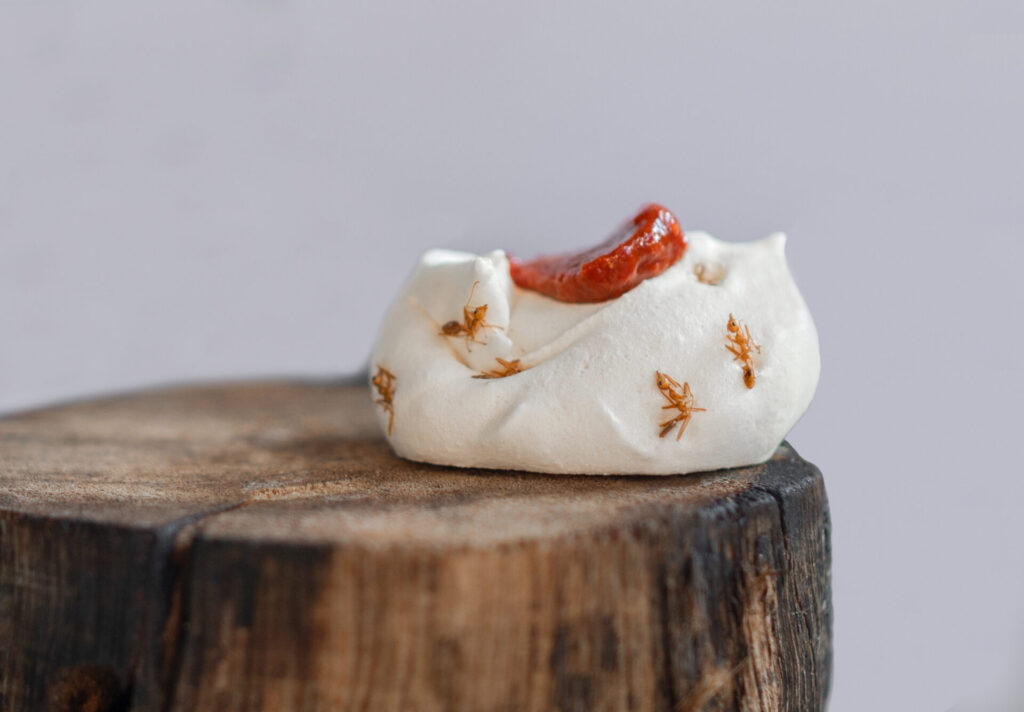
We work with local farmers to source the freshest, highest-quality ingredients for our dishes, including Bannur lamb, sourced from Mysore, renowned for its tenderness, and its fat ratio and flavour. This is used to create a variety of dishes such as slow-cooked stews. of course, there are the fire ants of Farmlore— they have become an integral part of our ant bite offerings over the years!
KP: The kitchens run on a wood-fired oven fed with locally harvested mango wood. How does this reflect in the flavours of the food?
JE: The idea of cooking on a wood fire was born out of necessity during the Covid pandemic, when securing cooking gas became a challenge. We began experimenting, using pruned mango wood and Jamun wood from our farm. We found they imparted a unique character adding subtle notes of sweetness and smokiness to our cooked food. Wood-fired cooking also tapped into a long history that strengthened the narrative of our cuisine. By embracing wood-fired cooking, we’re reconnecting with the traditional techniques that shaped our cuisine.
KP: The wine pairings at Farmlore are always well curated. Please tell us a little about your wine selections.
JE: We focus on wines from local Indian wineries, particularly those from the Nashik Valley and Hampi, in Karnataka. These wines, made from local grape varieties, offer a unique perspective on the region’s terroir. Pairings are designed to complement the bold, aromatic flavours of our South Indian cuisine with wines that are often characterized by their bright acidity and moderate tannins. In addition, we offer an ‘Exploration’ wine list, which features wines from around the world, designed to showcase the diversity and complexity of global wine styles, and offer our guests a unique opportunity to discover a wider range of wines.
KP: Do you see more chefs moving towards exploring individual ingredients and making them the focus of their culinary skills?
JE: I believe that the trend of exploring individual ingredients and making them the focus of culinary skills is a necessary evolution in the culinary world. With increasing awareness of sustainability and environmental issues, chefs are looking for ways to reduce food waste and showcase the beauty of individual ingredients. Ingredient-driven cuisine offers a unique opportunity for chefs to tell the story of a particular ingredient, its origins, and its cultural significance. In an era where food can be overly complicated and manipulated, ingredient-driven cuisine offers a refreshing alternative. By stripping away unnecessary embellishments and focusing on the inherent qualities of an ingredient, chefs can create dishes that are both elegant and honest, while also promoting a more sustainable and authentic approach to food.
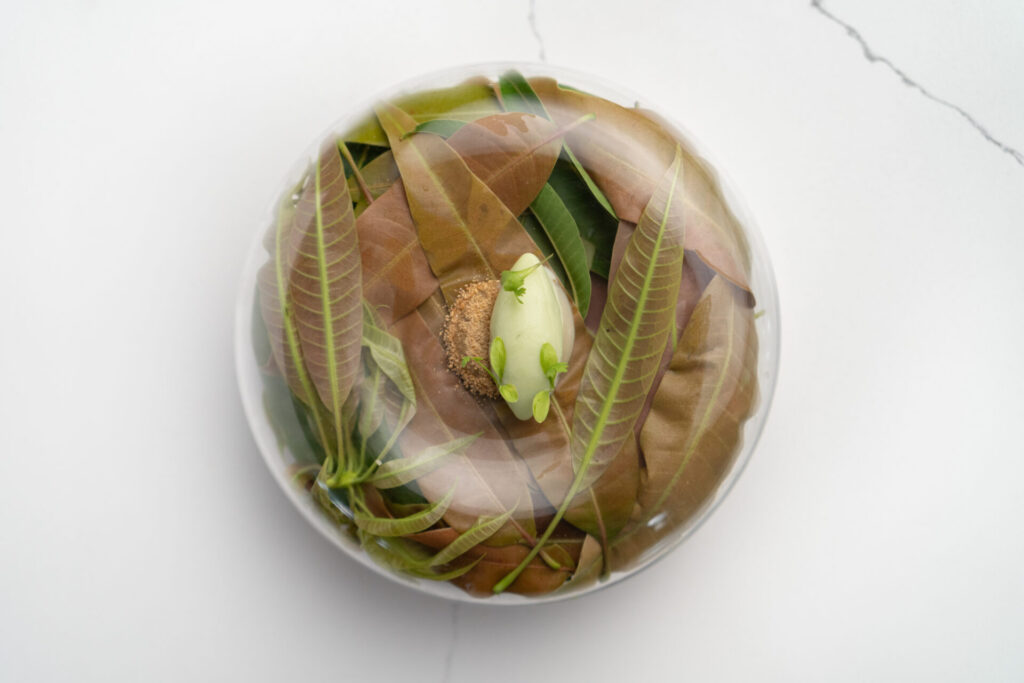
KP: What is the one cuisine you personally enjoy eating?
JE: To my understanding, the concept of cuisine can be quite restrictive. It implies a set of rigid rules, traditions, and expectations that can stifle creativity and innovation. It tends to categorize and compartmentalize food, creating artificial barriers between different cultures and traditions. I prefer to see food as a universal language, one that transcends cultural and geographical boundaries and instead, explores flavours, textures, and aromas without being tied to specific culinary traditions. This allows me to discover new ingredients, techniques, and flavour combinations that I might have otherwise overlooked. Now, when I eat, I simply enjoy food for what it is – a delicious combination of flavours, textures and aromas. I believe that this has allowed me to become a more open-minded, curious, and passionate cook.
Farmlore is open Wednesday to Sunday, 12.30 to 15.00; 18.30 to 22.00 (closed Monday & Tuesday) https://www.farmlore.in
Survey No:67, Mohan Raju Layout, Sathanur Village, Bagalur, Bengaluru, Karnataka-562149
Mail: reservations@loreblr.in
Ph: +91 8050248469
This article was published in Sommelier India Magazine, Spring 2025.

